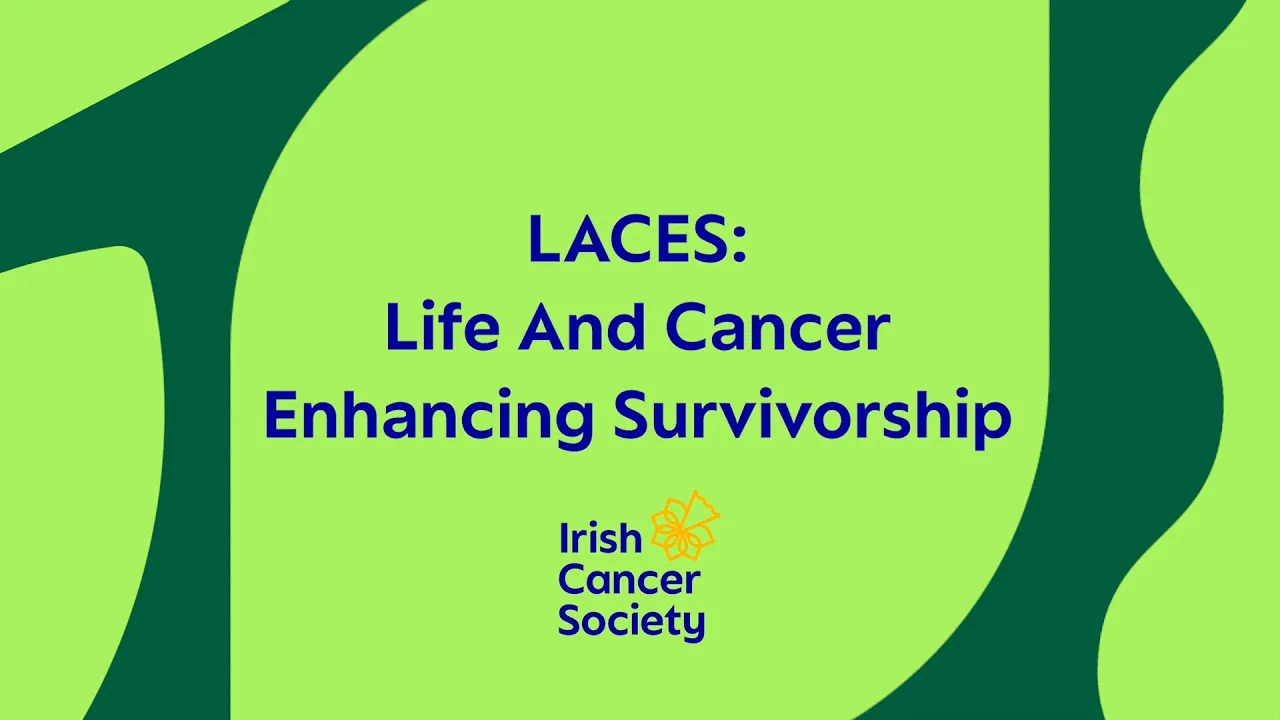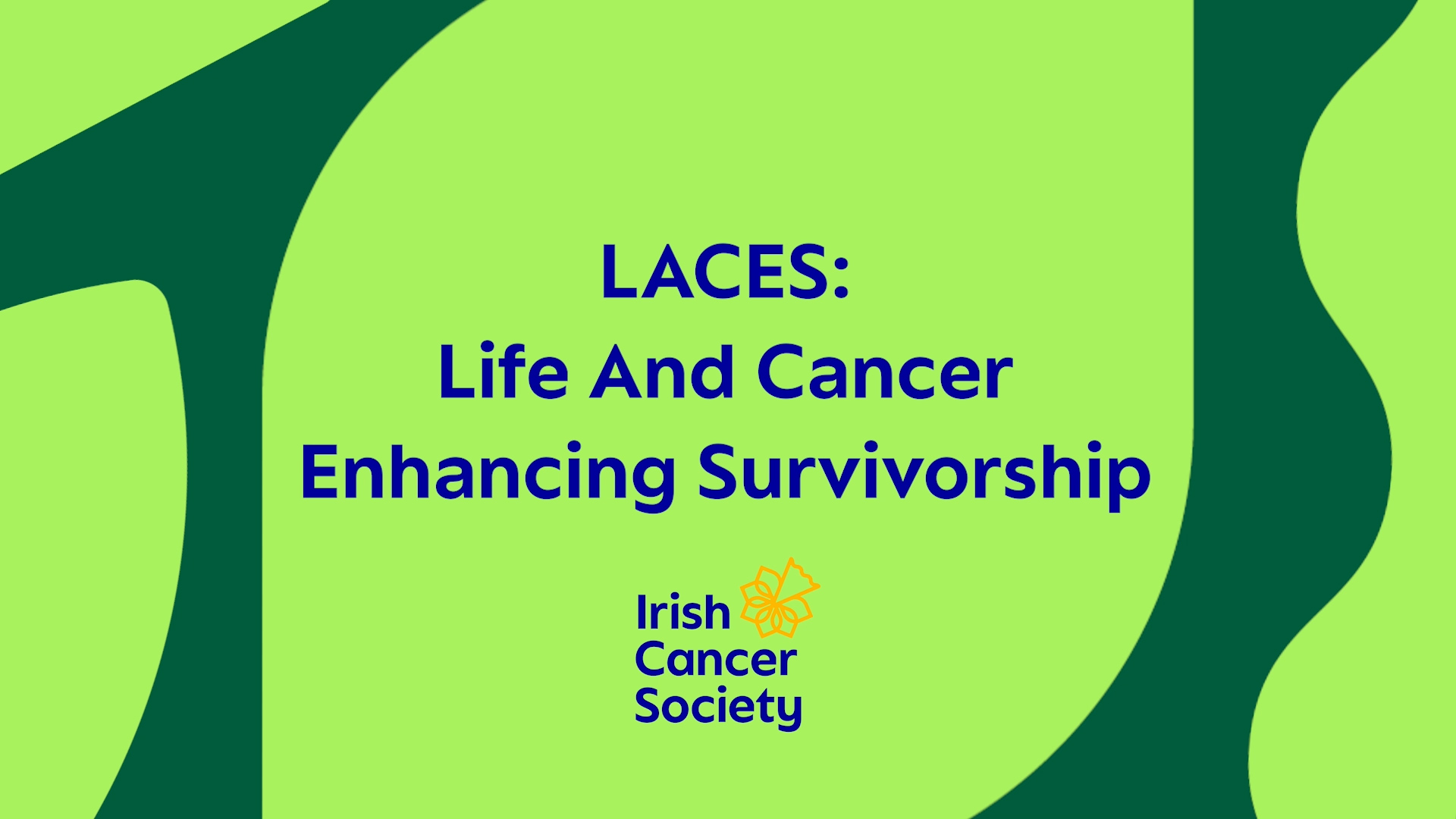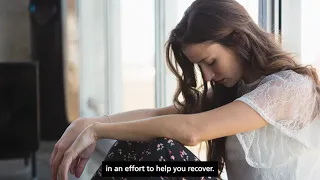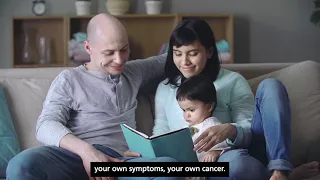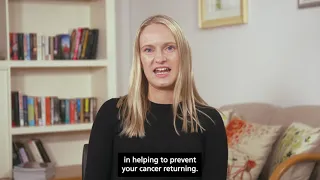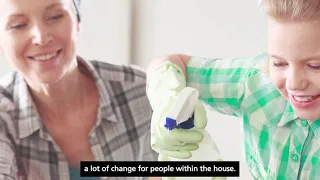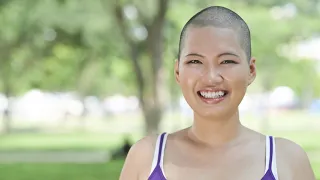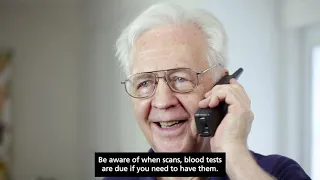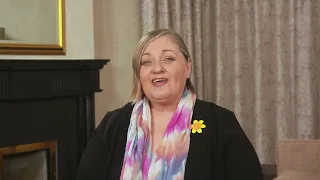LACES 6: Confidence
LACES: Life And Cancer - Enhancing Survivorship. A workshop from the Irish Cancer Society. Part 6: Confidence
0:01
LACES, Life And Cancer - Enhancing Survivorship Workshop.
0:13
Module 6: Confidence, Body image and Intimacy – In this module we will learn about how cancer treatment may impact your body image and your confidence.
0:29
Question: I'm upset about the way my body has changed. How can I feel better about it?
0:35
Body image is a term that we use to describe how you think and feel about yourself, and that can affect your confidence and your self-esteem. You need to be kind to yourself, take your time, all these things will get better over time.
0:50
So, it's quite normal after cancer surgery in particular, to have a lot of different scars. Also, after treatment you may have gained or lost weight. There could be other things that people don't see, like vaginal dryness, skin dryness. All those things do impact on how you feel and how you look.
1:10
So, when you look in the mirror, you may be quite shocked and upset but as time moves on that will get better and that will lessen.
1:18
Question: I have become self-conscious around my partner and it is affecting our relationship.
1:24
You may think that your partner finds you less attractive but that may not be the case at all. They may be looking for a way to help you, but not sure where to start. It's really important to communicate with your partner. A word from you, even if it's embarrassing, is really important and can make all the difference.
1:44
After your treatment, your relationships can change. Being intimate can become more difficult, and sometimes you need to explore new ways to be intimate, which might be as simple as hand-holding or just a simple cuddle.
2:01
Question: Will my sex life be affected?
2:07
So, for women, the treatment may cause your periods to temporarily stop or it may cause an early menopause, and this can cause changes in your sex life. You may have things like vaginal irritation or vaginal dryness, and you may have a low libido or a low sex drive.
2:27
For men, the treatment may cause a low libido or impotence or erectile dysfunction. Your partner may be reluctant to put pressure on you or to touch you, and it's important to talk about this.
2:40
Depending on the type of cancer or the type of surgery you had, you may need to start slowly because you may cause some pain or discomfort. The most important thing is to take things slowly. You need to be open and honest; your partner will be as nervous as you are. Being open and honest about how you feel is really important and will help you redevelop your sex life.
3:03
On the Irish Cancer Society website there are links to different aspects of cancer care that can help you through your journey.
3:12
Question: My scars are quite visible. What can I do?
3:18
Unfortunately, the scars can be a constant reminder of your surgery but they will fade over time. You can use moisturisers with vitamin E or bio oil to help improve them.
3:31
If you're feeling particularly self-conscious, clever clothing can help hide your scars. If it's on your face this may be more difficult, and you may opt for more invasive therapies, including laser dermabrasion or steroid injections.
3:50
It's important to talk to your oncologist about this because you will need a referral to a specialist service, which may include a dermatologist or a plastic surgeon.
4:01
Question: Are there supports to help people build their confidence?
4:07
We all know that if you look good on the outside, you feel better on the inside. Your cancer treatment may have left you with dry skin, you may have lost your hair, your eyebrows, or you may have gained or lost weight.
4:22
There are supports out there to help you with that. The ‘look good, feel better’ workshops can help you make the most of your makeup and your skincare products. Your local pharmacist can discuss products that are suitable for your skin, which is often quite sensitive after treatment.
4:42
Your hairdresser or your barber can help you with your hair growing back and suggest suitable styles or hair colours that you can use.
4:52
It's very common for people with cancer to compare themselves with others. You must remember that everybody's experience is very different, and it can be absolutely exhausting to compare yourself to others all the time.
5:06
Question: What advice do you have for people who want to get back to their social life?
5:12
There are lots of opportunities on your doorstep. Your local community centre is a great place to start. They have lots of activities, including men's sheds, pottery classes, coffee mornings, women's groups. So, please get involved. Check out the noticeboard in your local supermarket.
5:33
Sometimes it can be very nerve-wracking to get back out there, and you may have lost a lot of self-confidence or self-esteem after your treatment. The community centres often have a link worker that can help introduce you to these activities. And this is called ‘social prescribing’.
5:51
We also recommend that you link in with your local cancer support centre, as they can recommend other activities in your local area that might help you.
6:02
Question: I don't feel like I have as much in common with my friends now. What can I do?
6:08
Sometimes your life focuses around your visits to the hospital, and you've just got out of the habit of socialising. Sometimes during treatment people can stop doing the things that they enjoy because they lose their self-confidence and their self-esteem. It's important for you to get yourself back out there, and this can be quite hard. You may need to move outside your comfort zone.
6:34
Question: Where can I get more information about my type of cancer?
6:40
Sometimes it's only after your treatment is finished that you want more information on your cancer or the treatment that you had, and that's okay. It can be a whirlwind at the very start, when you're diagnosed first and you get a huge amount of information, and it's only afterwards that you realise that there's certain specifics that you'd like to know.
7:00
Don't be afraid to ask your doctor or your nurse for more specific information about your cancer. It's important that you go to trusted sources, like the NCCP or the Irish Cancer Society websites.
7:16
Question: How can I look after my general health?
7:22
Your general health and wellbeing is very important when your treatment finishes, and it's important for you to check in with your GP once a year to have the general checks, like your blood pressure, cholesterol and blood sugars.
7:37
Make sure you register with the national screening programmes: breast check, bowel check and cervical check.
7:44
If you're still smoking, now would be a good time to quit. You can get some support from your local pharmacist or with quit.ie
7:54
Question: How long until I get back to the way I was before?
8:01
It's not realistic to expect to go back to the way you were before your treatment. You've changed both physically and mentally. Also, you need to remember that you're getting older as you go to your treatment, so it's not realistic to expect to be the way you were a year or two before that. You may hear us refer to this as the ‘new norm’. It's about getting to know the new you, which might even be a healthier you.
8:28
For more information, please visit www.cancer.ie/LACES
LACES: Life And Cancer – Enhancing Survivorship playlist
